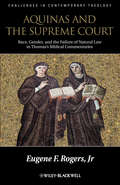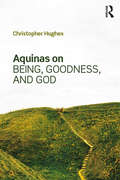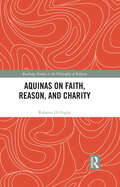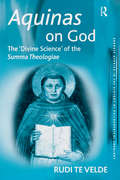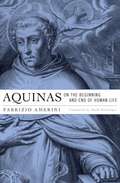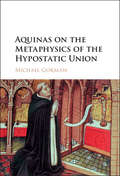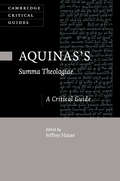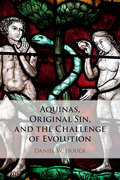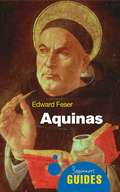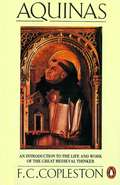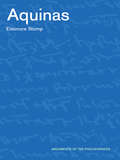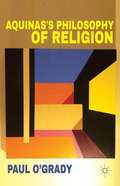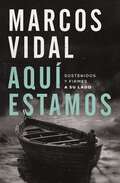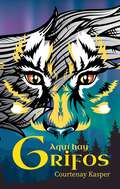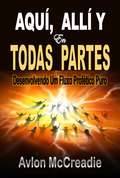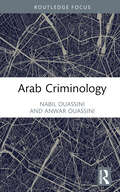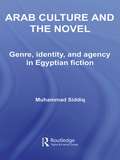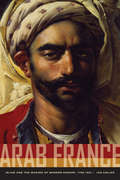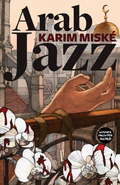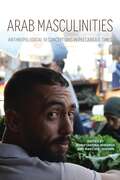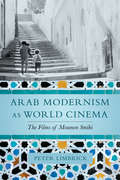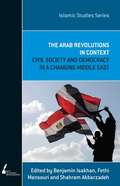- Table View
- List View
Aquinas and the Nicomachean Ethics
by Matthias Perkams Tobias Hoffmann Jörn MüllerAristotle's Nicomachean Ethics is the text which had the single greatest influence on Aquinas's ethical writings, and the historical and philosophical value of Aquinas's appropriation of this text provokes lively debate. In this volume of new essays, thirteen distinguished scholars explore how Aquinas receives, expands on, and transforms Aristotle's insights about the attainability of happiness, the scope of moral virtue, the foundation of morality, and the nature of pleasure. They examine Aquinas's commentary on the Ethics and his theological writings, above all the Summa theologiae. Their essays show Aquinas to be a highly perceptive interpreter, but one who also who also brings certain presuppositions to the Ethics and alters key Aristotelian notions for his own purposes. The result is a rich and nuanced picture of Aquinas's relation to Aristotle that will be of interest to readers in moral philosophy, Aquinas studies, the history of theology, and the history of philosophy.
Aquinas and the Supreme Court: Race, Gender, and the Failure of Natural Law in Thomas's Bibical Commentaries (Challenges in Contemporary Theology)
by Eugene F. Rogers Jr.This new work clarifies Aquinas’ concept of natural law through his biblical commentaries, and explores its applications to U.S. constitutional law. The first time the use of Aquinas on the U.S. Supreme Court has been explored in depth, and its applications tested through a rigorous reading of the biblical commentaries Shows how key judgments in the Supreme Court have rested on medieval natural law, and applies critical gender theory to discuss problems with these applications Offers new research data to give a different picture of Aquinas and natural law, and a fresh take on Aquinas’ biblical commentaries New research based on passages in the biblical commentaries never before available in English
Aquinas on Being, Goodness, and God
by Christopher HughesThomas Aquinas is one of the most important figures in the history of philosophy and philosophical theology. Relying on a deep understanding of Aristotle, Aquinas developed a metaphysical framework that is comprehensive, detailed, and flexible. Within that framework, he formulated a range of strikingly original and carefully explicated views in areas including natural theology, philosophy of mind, philosophical psychology, and ethics. In this book, Christopher Hughes focuses on Aquinas’s thought from an analytic philosophical perspective. After an overview of Aquinas’s life and works, Hughes discusses Aquinas’s metaphysics, including his conception of substance, matter, and form, and his account of essence and existence; and his theory of the nature of human beings, including his critique of a substance dualism that Aquinas attributes to Plato, but is usually associated with Descartes. In the final chapters, Hughes discusses Aquinas’s account of the existence and nature of God, and his treatment of the problem of evil, as well as his ideas about the relation of goodness to being, choice, and happiness. Aquinas on Being, Goodness, and God is essential reading for students and scholars of Aquinas, and anyone interested in philosophy of religion or the history of medieval philosophy.
Aquinas on Faith, Reason, and Charity (Routledge Studies in the Philosophy of Religion)
by Roberto Di CeglieThis book offers a new reading of Aquinas’ views on faith. The author argues that the theological nature of faith is crucial to Aquinas’ thought, and that it gives rise to a peculiar and otherwise incomprehensible relationship with reason. The first part of the book examines various modern and contemporary accounts of the relationship between faith and reason in Aquinas’ thought. The author shows that these accounts are unconvincing because they exhibit what he calls a Lockean view of faith and reason, which maintains that the relationship in question should only be treated by way of evidence. In other words, this view ignores the specific nature of the Christian faith and the equally specific way it needs to relate to reason. The second part offers a comprehensive account of Aquinas’ view of faith. It focuses on the way the divine grace and charity shape the relationship between evidence and human will. The final part of the book ties these ideas together to show how Christian faith, with its specifically theological nature, is perfectly compatible with rational debates. It also argues that employing the specificity of faith may constitute the best way to promote autonomous and successful rational investigations. Aquinas on Faith, Reason, and Charity will be of interest to scholars and advanced students working on Aquinas, philosophy of religion, Christian theology, and medieval philosophy.
Aquinas on God: The 'Divine Science' of the Summa Theologiae (Ashgate Studies in the History of Philosophical Theology)
by Rudi Te VeldeAquinas on God presents an accessible exploration of Thomas Aquinas' conception of God. Focusing on the Summa theologiae - the work containing Aquinas' most systematic and complete exposition of the Christian doctrine of God - Rudi te Velde acquaints the reader with Aquinas' theological understanding of God and the metaphysical principles and propositions that underlie his project. Aquinas' conception of God is dealt with not as an isolated metaphysical doctrine, but from the perspective of his broad theological view which underlies the scheme of the Summa. Readers interested in Aquinas, historical theology, metaphysics and metaphysical discourse on God in the Christian tradition will find this new contribution to the studies of Aquinas invaluable.
Aquinas on Human Self-Knowledge
by Therese Scarpelli CorySelf-knowledge is commonly thought to have become a topic of serious philosophical inquiry during the early modern period. Already in the thirteenth century, however, the medieval thinker Thomas Aquinas developed a sophisticated theory of self-knowledge, which Therese Scarpelli Cory presents as a project of reconciling the conflicting phenomena of self-opacity and privileged self-access. Situating Aquinas's theory within the mid-thirteenth-century debate and his own maturing thought on human nature, Cory investigates the kinds of self-knowledge that Aquinas describes and the questions they raise. She shows that to a degree remarkable in a medieval thinker, self-knowledge turns out to be central to Aquinas's account of cognition and personhood, and that his theory provides tools for considering intentionality, reflexivity and selfhood. Her engaging account of this neglected aspect of medieval philosophy will interest readers studying Aquinas and the history of medieval philosophy more generally.
Aquinas on the Beginning and End of Human Life
by Fabrizio AmeriniIn contemporary discussions of abortion, both sides argue well-worn positions, particularly concerning the question, When does human life begin? Though often invoked by the Catholic Church for support, Thomas Aquinas in fact held that human life begins after conception, not at the moment of union. But his overall thinking on questions of how humans come into being, and cease to be, is more subtle than either side in this polarized debate imagines. Fabrizio Amerini--an internationally renowned scholar of medieval philosophy--does justice to Aquinas's views on these controversial issues. Some pro-life proponents hold that Aquinas's position is simply due to faulty biological knowledge, and if he knew what we know today about embryology, he would agree that human life begins at conception. Others argue that nothing Aquinas could learn from modern biology would have changed his mind. Amerini follows the twists and turns of Aquinas's thinking to reach a nuanced and detailed solution in the final chapters that will unsettle familiar assumptions and arguments. Systematically examining all the pertinent texts and placing each in historical context, Amerini provides an accurate reconstruction of Aquinas's account of the beginning and end of human life and assesses its bioethical implications for today. This major contribution is available to an English-speaking audience through translation by Mark Henninger, himself a noted scholar of medieval philosophy.
Aquinas on the Metaphysics of the Hypostatic Union
by Michael GormanThe hypostatic union of Christ, namely his being simultaneously human and divine, is one of the founding doctrines of Christian theology. In this book Michael Gorman presents the first full-length treatment of Aquinas's metaphysics of the hypostatic union. After setting out the historical and theological background, he examines Aquinas's metaphysical presuppositions, explains the basic elements of his account of the hypostatic union, and then enters into detailed discussions of four areas where it is more difficult to get a clear understanding of Aquinas's views, arguing that in some cases we must be content with speculative reconstructions that are true to the spirit of Aquinas's thought. His study pays close attention to the Latin texts and their chronology, and engages with a wide range of secondary literature. It will be of great interest to theologians as well as to scholars of metaphysics and medieval thought.
Aquinas's Summa Theologiae: A Critical Guide (Cambridge Critical Guides)
by Jeffrey HauseAlone among Thomas Aquinas's works, the Summa Theologiae contains well-developed and integrated discussions of metaphysics, ethics, law, human action, and the divine nature. The essays in this volume, by scholars representing varied approaches to the study of Aquinas, offer thorough, cutting-edge expositions and analyses of these topics and show how they relate to Aquinas's larger system of thought. The volume also examines the reception of the Summa Theologiae from the thirteenth century to the present day, showing how scholars have understood and misunderstood this key text, and how, even after seven centuries of interpretation, we still have much to learn from it. Detailed and accessible, this book will be highly important for scholars and students of medieval philosophy and theology.
Aquinas, Bonaventure, and the Scholastic Culture of Medieval Paris: Preaching, Prologues, and Biblical Commentary
by Randall SmithIn this volume, Randall B. Smith provides a revisionist account of the scholastic culture that flourished in Paris during the High Middle Ages. Exploring the educational culture that informed the intellectual and mental habits of Thomas Aquinas and Bonaventure, he offers an in-depth study of the prologues and preaching skills of these two masters. Smith reveal the intricate interrelationships between the three duties of the master: lectio (reading), disputatio (debate), and praedicatio (preaching). He also analyzes each of Aquinas and Bonaventure's prologues from their student days to their final works, revealing both their artistry and their instructional character. Written in an engaging style, this book serves as an invaluable resource that will enable scholars and students to read thirteenth-century sermons, prologues, and biblical commentaries with greater understanding and ease.
Aquinas, Original Sin, and the Challenge of Evolution
by Daniel W. HouckIs original sin compatible with evolution? Many today believe the answer is 'No'. Engaging Aquinas's revolutionary account of the doctrine, Daniel W. Houck argues that there is not necessarily a conflict between this Christian teaching and mainstream biology. He draws on neglected texts outside the Summa Theologiae to show that Aquinas focused on humanity's loss of friendship with God - not the corruption of nature (or personal guilt). Aquinas's account is theologically attractive in its own right. Houck proposes, moreover, a new Thomist view of original sin that is consonant with evolution. This account is developed in dialogue with biblical scholarship on Jewish hamartiology and salient modern thinkers (including Kant, Schleiermacher, Barth, and Schoonenberg), and it is systematically connected to debates over nature, grace, the desire for God, and justification. In addition, the book canvasses a number of neglected premodern approaches to original sin, including those of Anselm, Abelard, and Lombard.
Aquinas: A Beginner's Guide (Beginner's Guides)
by Edward FeserOne of the most influential philosophers and theologians in history, St. Thomas Aquinas was the father of modern philosophy of religion, and is infamous for his "proofs" for God's existence. In this cogent introduction to the great Saint's work, Edward Feser argues that you cannot fully understand Aquinas' philosophy without his theology and vice versa. Covering his thoughts on the soul, natural law, metaphysics, and the interaction of faith and reason, this will prove indispensable for students, experts or the general reader.
Aquinas: An Introduction to the Life and Work of the Great Medieval Thinker
by F. CoplestonAquinas (1224-74) lived at a time when the Christian West was opening up to a wealth of Greek and Islamic philosophical speculation. An embodiment of the thirteenth-century ideal of a unified interpretation of reality (in which philosophy and theology work together in harmony), Aquinas was remarkable for the way in which he used and developed this legacy of ancient thought—an achievement which led his contemporaries to regard him as an advanced thinker. Father Copleston's lucid and stimulating book examines this extraordinary man—whose influence is perhaps greater today than in his own lifetime—and his thought, relating his ideas wherever possible to problems as they are discussed today.
Aquinas: Essays In Honor Of Norman Kretzmann (Arguments of the Philosophers)
by Eleonore StumpFew philosophers or theologians exerted as much influence on the shape of medieval thought as Thomas Aquinas. He ranks amongst the most famous of the Western philosophers and was responsible for almost single-handedly bringing the philosophy of Aristotle into harmony with Christianity. He was also one of the first philosophers to argue that philosophy and theology could support each other. The shape of metaphysics, theology, and Aristotelian thought today still bears the imprint of Aquinas' work.In this extensive and deeply researched study, Eleonore Stump examines Aquinas' major works, Summa Theologiae and Summa Contra Gentiles, and clearly assesses the vast range of Aquinas' thought. Philosophers, theologians, and students of the medieval period alike will find this unrivalled study an indispensable resource in researching and teaching Aquinas.
Aquinas’s Philosophy of Religion
by Paul O’GradyThis is an exploration and analysis of Aquinas's contribution to the philosophy of religion. It examines Aquinas's contexts, his views on philosophy and theology, as well as faith and reason. His arguments for God's existence, responses to objections against God's existence and his characterization of the nature of God are examined.
Aquí estamos: Sostenidos y firmes a su lado
by Marcos VidalExperimenta la transformación que resulta de decir «SÍ» a Jesús: eligiendo compromiso sobre excusas, fe sobre dudas y acción sobre vacilación. ¿Qué motiva a alguien a servir al Señor durante años? ¿Qué cualidades especiales se necesitan? ¿Es factible para cualquiera seguir ese camino? Este libro responde estas y otras preguntas que todos los seguidores de Cristo nos planteamos.En Aquí estamos, Marcos Vidal, pastor, cantante y autor reconocido, te invita a una exploración sincera y personal para revitalizar tu compromiso con Jesucristo, sin importar tu profesión, educación o talentos.Este libro es para aquellos que:Se sientan desanimados e intimidados en su camino con JesúsTienen dudas y no saben por dónde ni cómo empezarTemen no poder cumplir con el SeñorCon una profunda sabiduría bíblica, compasión genuina e historias personales, Vidal revela la inquebrantable verdad de que Dios te espera pacientemente, dondequiera que estés.El momento es AHORA, el mensaje es claro: si Él te llamó, ¡claro que puedes! No mires atrás. Después de leer este libro, responderás con confianza: «¡Por la gracia de Dios, AQUÍ ESTAMOS!»Here We AreExperience the transformation that results from saying &“YES&” to Jesus: choosing commitment over excuses, faith over doubt and action over hesitation.What motivates someone to serve the Lord for years? What special qualities are needed? Is it feasible for anyone to follow that path? This book answers these and other questions that all followers of Christ ask themselves.In Here We Are, Marcos Vidal, pastor, singer, and renowned author, invites you to a sincere and personal exploration to revitalize your commitment to Jesus Christ, regardless of your profession, education, or talents.This book is for those who:Feel discouraged and intimidated in their walk with JesusHave doubts and don&’t know where or how to beginFear they will not be able to live up to the LordWith profound biblical wisdom, genuine compassion, and personal stories, Vidal reveals the unshakable truth that God is patiently waiting for you, no matter where you stand.The time is NOW, the message is clear: if He called you, of course you can! Don't look back. After reading this book, you will respond with confidence, &“By the grace of God, HERE WE ARE!&”
Aquí hay Grifos (Más allá del ciclo del viento del norte #1)
by Courtenay KasperAquí hay Grifos (Más allá del cliclo de los Vientos del Norte Libro 1) (2020) - Cuando Molybdenum McTavish, de 12 años, encuentra un huevo de grifo en el patio de remolques de su abuelo, se ve envuelta en una aventura vertiginosa que la lleva más allá del viento del norte y fuera de su propio mapa. Moly debe descubrir quién es y en quién puede confiar antes de que el último de los grifos sea brutalmente asesinado y la gente de Hyperborea se convierta en esclava. ¿Pueden una niña y su grifo tigre recién nacido derrotar a una horda de Arim tuerto antes de que sea demasiado tarde?
Aquí, Allí y En Todas Partes: El hombre que vio el Futuro
by Avlon McCreadieSoy Paul. No estoy seguro de qué pasó, pero desperté y todo en mi mundo era diferente. No sé cómo interpretarlo. Todos actúan como si esto fuese normal. Como si siempre hubiese sido así. Parece que soy el único que sabe que no es así. Solo no sé qué hacer al respecto.
Arab Criminology (Criminology in Focus)
by Nabil Ouassini Anwar OuassiniThe objective of Arab Criminology is to establish a criminological sub-field called ‘Arab Criminology.’ The ever-evolving field of criminology has advanced in the past decade, yet many impediments remain. Unlike criminology in Africa, Asia, the Americas, Europe, and Oceania based merely on geopolitical constructs, the Arab world has unique commonalities that do not exist in the other established sub-fields on criminology. The Arab world has largely remained in criminology’s periphery despite the region’s considerable importance to current international affairs. In response, this book explores two main questions: Why should we and how do we establish a sub-field in Arab Criminology? The authors examine the state of criminology in the Arab world, define its parameters, and present four components that bond and distinguish Arab criminology from other criminological area studies. They then identify the requirements for establishing Arab criminology and detail how local, regional, and international researchers can collaborate, develop, and expand the sub-field. Arab Criminology will challenge some of the recurrent Orientalist and Islamophobic tropes in Northern criminology and progress the discipline of criminology to reflect a more diverse focus that embraces regions from the Global South. Presenting compelling arguments and examples that support the establishment of this sub-field, Arab Criminology will be of great interest to Criminology, Criminal Justice, Legal Studies, and Middle Eastern/North African studies scholars, particularly those working on Southern Criminology, Comparative Criminology, International Criminal Justice Systems, and Arab studies.
Arab Culture and the Novel: Genre, Identity and Agency in Egyptian Fiction (Routledge Studies in Middle Eastern Literatures #Vol. 16)
by Muhammad SiddiqThis book explores the complex relationship between the novel and identity in modern Arab culture against a backdrop of contemporary Egypt. It uses the example of the Egyptian novel to interrogate the root causes – religious, social, political, and psychological – of the lingering identity crisis that has afflicted Arab culture for at least two centuries.
Arab France
by Ian CollerMany think of Muslims in Europe as a twentieth century phenomenon, but this book brings to life a lost community of Arabs who lived through war, revolution, and empire in early nineteenth century France. Ian Coller uncovers the surprising story of the several hundred men, women, and children--Egyptians, Syrians, Greeks, and others--who followed the French army back home after Napoleon's occupation of Egypt. Based on research in neglected archives, on the rediscovery of forgotten Franco-Arab authors, and on a diverse collection of visual materials, the book builds a rich picture of the first Arab France--its birth, rise, and sudden decline in the age of colonial expansion. As he excavates a community that was nearly erased from the historical record, Coller offers a new account of France itself in this pivotal period, one that transcends the binary framework through which we too often view history by revealing the deep roots of exchange between Europe and the Muslim world, and showing how Arab France was in fact integral to the dawn of modernity.
Arab Jazz
by Karim MiskéKosher sushi, kebabs, a second hand bookshop and a bar: the 19th arrondissement in Paris is a cosmopolitan neighbourhood where multicultural citizens live, love and worship alongside one another. This peace is shattered when Ahmed Taroudant's melancholy daydreams are interrupted by the blood dripping from his upstairs neighbour's brutally mutilated corpse. The violent murder of Laura Vignole, and the pork joint placed next to her, set imaginations ablaze across the neighborhood, and Ahmed finds himself the prime suspect. However detectives Rachel Kupferstein and Jean Hamelot are not short of leads. What is the connection between a disbanded hip-hop group and the fiery extremist preachers that jostle in the streets for attention? And what is the mysterious new pill that is taking the district by storm? In this his debut novel, Karim Miské demonstrates a masterful control of setting, as he moves seamlessly between the sensual streets of Paris and the synagogues of New York to reveal the truth behind a horrifying crime.
Arab Masculinities: Anthropological Reconceptions in Precarious Times (Public Cultures of the Middle East and North Africa)
by Laura Ferrero Alice Elliot Jamie Furniss Bård Helge Kårtveit Hsain Ilahiane Anne Hovgaard Jørgensen Gustavo Barbosa Sabiha Allouche Lisa L. WynnArab Masculinities provides a groundbreaking analysis of Arab men's lives in the precarious aftermath of the 2011 Arab uprisings. It challenges received wisdoms and entrenched stereotypes about Arab men, offering new understandings of rujula, or masculinity, across the Middle East and North Africa.The 10 individual chapters of the book foreground the voices and stories of Arab men as they face economic precarity, forced displacement, and new challenges to marriage and family life. Rich in ethnographic details, they illuminate how men develop alternative strategies of affective labor, how they attempt to care for themselves and their families within their local moral worlds, and what it means to be a good son, husband, father, and community member. Arab Masculinities sheds light on the most private spaces of Arab men's lives—offering stories that rarely enter the public realm. It is a pioneering volume that reflects the urgent need for new anthropological scholarship on men and masculinities in a changing Middle East.
Arab Modernism as World Cinema: The Films of Moumen Smihi
by Peter LimbrickArab Modernism as World Cinema explores the radically beautiful films of Moroccan filmmaker Moumen Smihi, demonstrating the importance of Moroccan and Arab film cultures in histories of world cinema. Addressing the legacy of the Nahda or "Arab Renaissance" of the nineteenth and early twentieth century—when Arab writers and artists reenergized Arab culture by engaging with other languages and societies—Peter Limbrick argues that Smihi’s films take up the spirit of the Nahda for a new age. Examining Smihi’s oeuvre, which enacts an exchange of images and ideas between Arab and non-Arab cultures, Limbrick rethinks the relation of Arab cinema to modernism and further engages debates about the use of modernist forms by filmmakers in the Global South. This original study offers new routes for thinking about world cinema and modernism in the Middle East and North Africa, and about Arab cinema in the world.
Arab Revolutions in Context: Civil Society and Democracy in a Changing Middle East (Islamic Studies Series)
by Fethi Mansouri Shahram Akbarzadeh Benjamin IsakhanFrom late 2010 a series of dramatic and unprecedented events swept across the Middle East and North Africa, toppling several autocratic regimes that had held power for decades and ushering in a new climate of dissent and democratisation. The Arab Revolutions in Context seizes a unique opportunity to reflect on these seismic events, their causes and consequences, and the core issues facing the region as it moves forward. This volume is more than a collection of detailed thematic essays.It situates the Arab Revolutions within their broader contextual backgrounds—showing that a unique set of historical events, as well as local, regional and global dynamics, has converged to provide the catalyst that triggered the recent revolts-and also within a new conceptual framework. The argument here is that the Arab Revolutions pose a very specific challenge to conventional wisdom concerning democracy and democratisation in the Middle East. The Arab Revolutions in Context is the first volume of its kind to address the Arab Revolutions and the varying analyses, debates and discussions that they have stimulated. Islamic Studies Series - Volume 12

